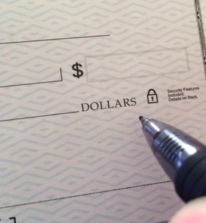
As a new business owner you may be wondering when you can start taking a paycheck. Or perhaps you invested personal savings to get your business off the ground and are wondering when to begin repaying yourself.
Over the holidays I met with a friend who opened his yoga studio nearly a year ago. The studio’s growing steadily — operating expenses are covered, and he’s netting about two thousand dollars in profit each month.
His question: “Now that we’re making money what should we do with it?”
After chatting for a while I learned that while he’s paying all of his instructors quite well, he isn’t yet paying himself.
Sound familiar?
In the beginning every incoming dollar goes toward operating expenses. As an owner, you’re often coaching classes or teaching lessons for free, and expenses get paid before you do.
When your business is generating enough revenue to cover your labor costs and all of your operating expenses — rent, utilities, bookkeeping, and so on — you get to decide how to allocate what’s left over — your net profit.
Here are four guidelines for paying yourself (while being mindful of the business) once you start to see some profit.
Pay yourself for services you provide
It’s important to fully understand the costs of running your business. If you’re both the owner and an instructor but aren’t paying labor on the sessions you’re teaching, you have an inaccurate view of your business’s total labor costs. Pay yourself as if you would pay any other employee with your experience.
Begin to repay any money you loaned your business to get started
If you loaned personal money to your business in order to get it off the ground, start paying that back now. Keep in mind that if you took out a traditional business loan you would be making payments immediately. If you were your own lender you could choose to delay repayment for some months while you got the business off the ground.
Take a nominal salary
If profits allow you can also start taking a nominal salary for the non-service-related work you do — marketing, cleaning, website and social media management, hiring, firing, and so on. Start to refine job descriptions and pay yourself and any other owners for these additional roles.
Plan for the future
Now that you’re paying yourself, let’s return to my friend’s question: “Now that we’re making money what should we do with it?”
It’s important that you leave enough cash in your business to allow you to grow. At some point you’ll grow beyond a nominal salary to one that is truly reflective of the value of the work you are doing for your business — but beyond that, be sure to leave enough in the business so that you can grow when and how you want. It’s a great feeling when you can make new equipment or expansion decisions without the need to look for a small business loan.
Spend some time thinking about your long term goals for your business. Do you have a day job you’d ultimately like to be able to transition away from? Do you want to build up enough capital so you can open additional locations or buy a building? A strong vision for your business’s future can help guide how you choose to allocate profits today.